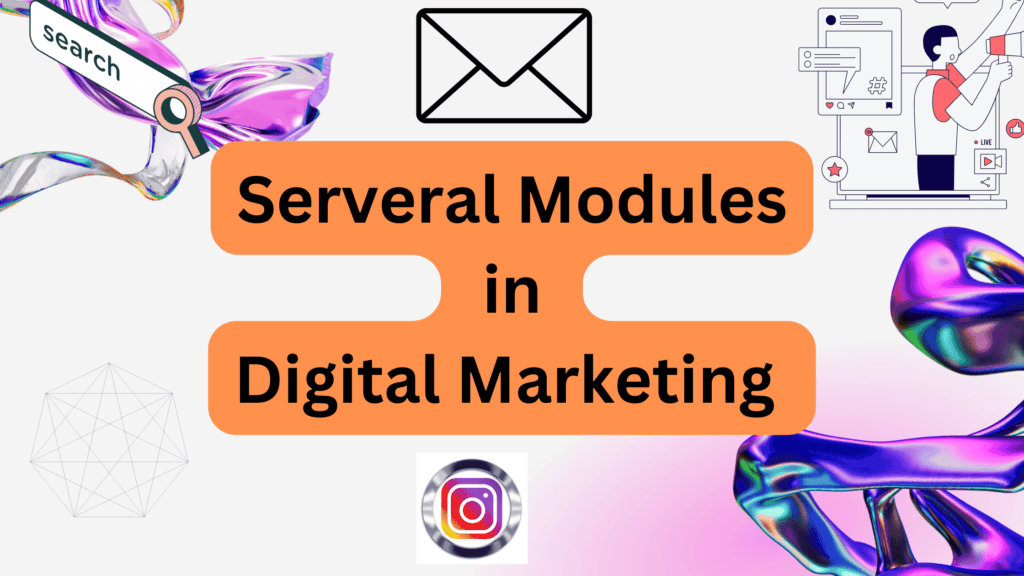Detailed explanation of Several modules in Digital Marketing

Several modules in Digital Marketing
This Blog will discuss several in digital marketing. Digital marketing has revolutionized the way businesses connect with their target audiences. With its diverse set of strategies, tools, and platforms, digital marketing provides unparalleled opportunities to drive engagement, boost sales, and establish brand authority. To maximize the benefits, it is essential to understand the key modules in digital marketing. Here, we provide an exhaustive breakdown of these modules to help you master the art of digital marketing.
1. Search Engine Optimization (SEO)
SEO is the backbone of any successful digital marketing strategy. It involves optimizing a website to rank higher in search engine results pages (SERPs). SEO encompasses several components:
- On-page SEO focuses on optimizing individual web pages by using relevant keywords, crafting compelling meta descriptions, and ensuring proper header structure.
- Off-page SEO: Involves activities outside your website, such as building high-quality backlinks, guest blogging, and engaging on social media platforms.
- Technical SEO: Includes enhancing website speed, mobile responsiveness, structured data, and crawlability.
- Keyword Research: Tools like Ahrefs, SEMrush, and Google Keyword Planner assist in identifying high-performing keywords for your niche.
By effectively implementing SEO strategies, businesses can increase organic traffic, improve visibility, and gain a competitive edge.
2. Pay-Per-Click Advertising (PPC)
PPC is a paid marketing strategy that drives instant traffic by displaying ads on platforms like Google Ads, Bing Ads, and social media. Key aspects of PPC include:
- Keyword targeting: Select high-converting keywords for ads.
- Ad Copy Creation: Crafting compelling and actionable ad content.
- Campaign Optimization: Monitoring performance metrics such as click-through rates (CTR) and cost-per-click (CPC) to enhance ROI.
- Retargeting: Engaging previous visitors through personalized ads.
PPC is a powerful way to achieve immediate visibility and drive qualified leads.
3. Content Marketing
Content marketing focuses on creating valuable, relevant, and engaging content to attract and retain an audience. Its components include:
- Blogs: Sharing in-depth articles to educate and inform readers.
- Infographics: Visual representations of data to simplify complex information.
- Videos: high-quality, engaging videos to boost retention and engagement.
- E-books and Whitepapers: Detailed resources offering insights into specific topics.
By delivering valuable content, businesses can establish authority, nurture relationships, and drive conversions.
4. Social Media Marketing (SMM)
Social media marketing leverages platforms like Facebook, Instagram, LinkedIn, and Twitter to build brand awareness and engage with audiences. The primary components include:
- Content Creation: Crafting shareable posts, stories, and videos.
- Engagement: Actively interacting with followers through comments, messages, and polls.
- Paid advertising: running targeted campaigns to reach specific demographics.
- Analytics: measuring performance using platform-specific insights.
An effective SMM strategy strengthens brand presence and fosters community engagement.
5. Email Marketing
Email marketing remains one of the most cost-effective digital marketing strategies. It involves sending personalized emails to nurture leads and retain customers. Key elements include:
- List Building: Growing an email list through opt-in forms, lead magnets, and landing pages.
- Segmentation: categorizing subscribers based on their preferences and behaviors.
- Automation: Using tools like Mailchimp or HubSpot to schedule and send automated email sequences.
- Performance Tracking: analyzing open rates, click-through rates, and conversions.
With the right approach, email marketing can drive significant engagement and ROI.
6. Affiliate Marketing
Affiliate marketing is a performance-based strategy where businesses reward affiliates for driving traffic or sales. Components of this module include:
- Affiliate Recruitment: Partnering with influencers, bloggers, and content creators.
- Tracking: Using affiliate tracking tools to monitor performance.
- Commission Structures: Offering competitive payouts to incentivize affiliates.
This strategy helps businesses expand their reach while maintaining a cost-effective approach.
7. Mobile Marketing
As mobile usage continues to rise, mobile marketing has become a crucial component of digital marketing. Its key strategies include:
- SMS marketing: sending promotional messages directly to users.
- Mobile-Optimized Websites: Ensuring a seamless user experience on mobile devices.
- App Marketing: Promoting apps through in-app advertising and app store optimization (ASO).
Mobile marketing enables businesses to connect with their audience on the go.
8. Web Analytics
Web analytics involves measuring and analyzing website data to make informed decisions. Essential tools include Google Analytics and Adobe Analytics. Key metrics to monitor:
- Traffic Sources: Identifying where visitors come from.
- Bounce Rate: Understanding why users leave your site.
- Conversion Rate: tracking the percentage of visitors who take desired actions.
- User Behavior: Analyzing heatmaps and click patterns.
Data-driven insights empower businesses to optimize their strategies effectively.
9. Conversion Rate Optimization (CRO)
CRO focuses on enhancing the user experience to increase the percentage of visitors converting into customers. Strategies include:
- A/B testing: experimenting with different elements to identify the best-performing variant.
- Optimized landing pages: crafting persuasive and visually appealing pages.
- Call-to-Actions (CTAs): Using clear and compelling CTAs to drive user actions.
By implementing CRO techniques, businesses can maximize their marketing efforts and improve ROI.
10. Influencer Marketing
Influencer marketing involves collaborating with influencers to promote products or services. Key components include:
- Identifying Influencers: Partnering with influencers whose audience aligns with your brand.
- Campaign planning: defining clear objectives and deliverables.
- Performance Analysis: Measuring reach, engagement, and ROI.
This module helps brands build trust and connect with niche audiences effectively.
Conclusion
Mastering the modules of digital marketing is essential for any business looking to thrive in the digital age. By integrating these strategies, businesses can create a robust online presence, engage with their target audience, and achieve long-term success.